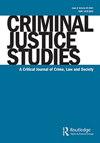美国同性婚姻合法化后的家庭暴力强制逮捕政策和对同性和异性亲密伴侣暴力的逮捕
IF 1.1
Q3 OPERATIONS RESEARCH & MANAGEMENT SCIENCE
引用次数: 1
摘要
从历史上看,对同性关系中亲密伴侣暴力(IPV)幸存者的法律保护一直缺乏。2015年,美国最高法院在奥贝格费尔诉霍奇斯案(Obergefell v. Hodges)中做出裁决,废除了对同性婚姻的限制,并为同性IPV的幸存者提供了更广泛的法律保护。在本文中,我们使用2016年国家事件报告系统(NIBRS)的数据分析了同性和异性IPV案件中的逮捕决定-这是奥贝格费尔事件后的第一年数据。我们还将我们的结果与之前的研究进行了比较,并复制和扩展了之前的分析,以查看奥贝格费尔事件后的逮捕是否有变化。自1977年以来,各州采用了三种类型的家庭暴力逮捕法中的一种:强制逮捕、支持逮捕和酌情逮捕。虽然强制性逮捕法增加了所有同性伴侣和女性同性伴侣被捕的可能性,但它们对男性同性伴侣的被捕没有影响。支持逮捕的法律不会增加同性伴侣被捕的可能性。最后,当受害者是“非白人”时,被捕的可能性降低是由于受害者是黑人的影响。本文将这些结果结合以往的IPV研究进行讨论。本文章由计算机程序翻译,如有差异,请以英文原文为准。
Domestic violence mandatory arrest policies and arrests for same-sex and opposite-sex intimate partner violence after legalization of same-sex marriage in the United States
ABSTRACT Historically, legal protection for survivors of intimate partner violence (IPV) in same-sex relationships has been lacking. This changed with the 2015 United States Supreme Court’s decision in Obergefell v. Hodges, which invalidated restrictions on same-sex marriage and made legal protections more widely available to survivors of same-sex IPV. In this paper, we analyze the arrest decision in cases of same-sex and opposite-sex IPV using data from the 2016 National Incident-Based Reporting System (NIBRS) – the first year of data post-Obergefell. We also compare our results to previous research and both replicate and extend earlier analyses to see if there are changes in arrest post-Obergefell. Since 1977, states have adopted one of the three types of domestic violence arrest laws: mandatory arrest, pro-arrest, and discretionary arrest. While mandatory arrest laws increase the likelihood of arrest for all and female same-sex couples, they do not have an impact on arrests for male same-sex couples. Pro-arrest laws do not increase the likelihood of arrest for same-sex couples. Finally, the decreased likelihood of arrest when the victim is ‘nonwhite’ is attributable to the impact of the victim being Black. These results are discussed in the context of previous research on IPV.
求助全文
通过发布文献求助,成功后即可免费获取论文全文。
去求助
来源期刊

CRIMINAL JUSTICE STUDIES
OPERATIONS RESEARCH & MANAGEMENT SCIENCE-
CiteScore
2.80
自引率
5.60%
发文量
17
期刊介绍:
Criminal Justice Studies, a quarterly refereed journal, publishes articles that deal with substantive criminal justice and criminological issues. The journal welcomes all articles that are relevant to the issue of criminal justice, as well as those that may be outside the field but have relevancy to the topic of criminal justice. Articles that cover public administration, issues of public policy, as well as public affairs issues are welcome. The journal also publishes relevant literature reviews, research notes and summary reports of innovative research projects in criminal justice. Qualitative and quantifiable articles are sought mainly from academics and researchers in the field, though articles from professionals will also be considered.
 求助内容:
求助内容: 应助结果提醒方式:
应助结果提醒方式:


